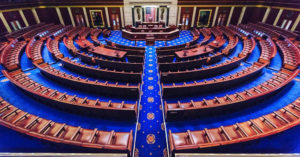Honoring Black History in Policy

There are countless ways to honor Black History Month. Among them are opportunities to celebrate historical Black leaders, probe our own local histories for the good and the bad, imagine Black futures, and put in the work to make those futures a reality.
But to authentically honor Black History, we can’t relegate it to one month. We must relentlessly examine our histories (the good and the bad, the transparent and the opaque) and allow those histories to inform the path forward.
As an advocacy organization, the American Humanist Association (AHA) believes the path forward must include evidence-based and anti-racist policies. The country is at the start of a new Congress, which presents new opportunities to advance long-standing goals. Here are a few bills we will continue to support this Congress. We encourage humanists to learn more about these bills and join us.
Reparations for Slavery
The AHA is proud to endorse H.R. 40, also known as the Commission to Study and Develop Reparations Proposal for African Americans Act. Humanists’ commitment to anti-racism would be feeble without support for reparations for slavery and its protracted negative effects on African Americans and society. Therefore, we continue to support H.R. 40, which, if enacted, would create a commission to study the impact of slavery and discrimination in the United States, and recommend appropriate remedies to Congress. It’s a first step in a long process toward accountability.
The bill received a hearing in the House last week, signaling strong support from the Democratic-led majority. But it faces an uphill battle in the Senate.
Voting Rights
The 2020 elections tested the strength of our democracy at large and our electoral process in particular. But, the faults in our election system are not new; they are the results of years of racism, partisanship, and self-serving policy that protects the interests of those in power over the power of the voter. Voter suppression impacts Black voters, but also the elderly, indigenous people, and other racial minorities.
Congress has an opportunity to pass multiple pieces of legislation that would apply evidence-based solutions to significantly improve the fairness of our elections. This includes two bills that directly confront the white supremacist holds on our electoral system: the John Lewis Voting Rights Advancement Act and the For the People Act. The John Lewis Voting Rights Advancement Act—which we expect to be reintroduced later this Congress—would restore the full protections of the Voting Rights Act of 1965, which were sharply and disastrously curtailed by the 2013 Supreme Court decision in Shelby County v. Holder. The For the People Act is a more extensive election reform package that addresses voting rights, campaign finance, and campaign ethics.
Countering Racist Policing Practices
The AHA also supports the George Floyd Justice in Policing Act, which we also expect to be reintroduced later this Congress. Targeting another symptom of white supremacy in the United States, the Justice in Policing Act would increase accountability measures for law enforcement engaged in constitutional violations, improve transparency and data collection of misconduct by creating a national registry to track and better understand police misconduct, and prohibit certain discriminatory practices such as racial profiling.
As these and other bills are introduced, humanists can voice their support by writing their members of Congress through our Humanist Action Headquarters.
Policymaking in our country is woefully slow, which has grave implications. But supporting each of these bills as they are introduced in the 117th Congress and as they progress through the legislative process is one way we can all honor Black history.
